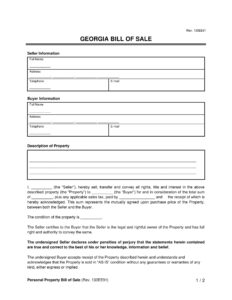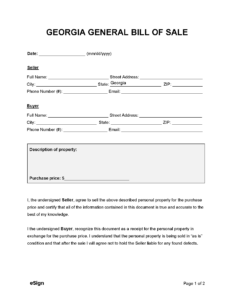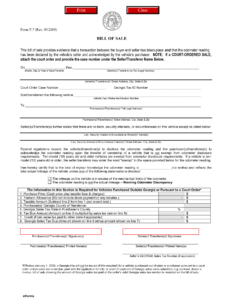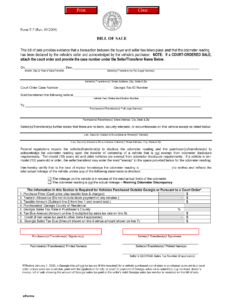Selling or buying a used car can be an exciting experience, but it also comes with its share of paperwork and legalities. One of the most critical documents you’ll need for any vehicle transaction in the state of Georgia is a car bill of sale. This seemingly simple piece of paper serves as a vital record, providing legal proof of the transfer of ownership from one party to another, protecting both the buyer and the seller from potential disputes down the road.
Whether you’re selling your trusty sedan or purchasing a new-to-you SUV from a private seller, having a properly completed bill of sale is not just good practice, it’s essential for a smooth and legally sound transaction. It helps to clarify the terms of the sale, record key details about the vehicle, and establish the date of transfer, all of which are crucial for registration, tax purposes, and liability protection.
Why You Absolutely Need a Car Bill of Sale in Georgia
When it comes to transferring vehicle ownership in Georgia, a bill of sale isn’t just a formality; it’s a cornerstone of a secure and transparent transaction. For the seller, it acts as a legal receipt proving that the vehicle is no longer their responsibility from the moment of sale. Imagine a scenario where the buyer gets into an accident or incurs parking fines shortly after the sale but before they’ve officially registered the vehicle in their name. Without a bill of sale, the previous owner could still be held liable, facing headaches and potential legal battles. This document clearly marks the date and time of ownership transfer, effectively ending your liability for the vehicle.
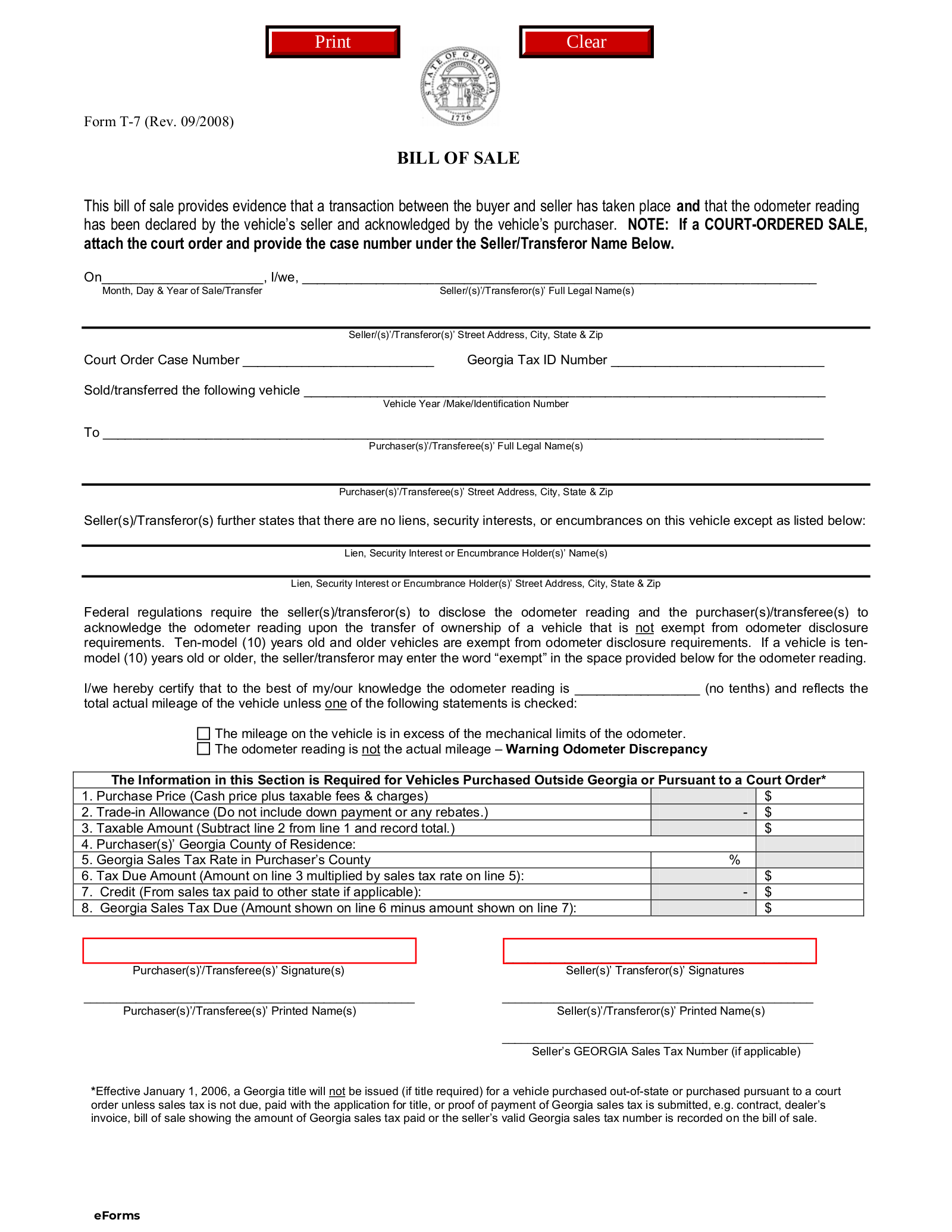
Furthermore, a well-drafted bill of sale protects the seller from future claims regarding the vehicle’s condition. Most private vehicle sales in Georgia are “as-is,” meaning the buyer accepts the vehicle in its current condition, without any warranties from the seller. Including an “as-is” clause on your bill of sale reinforces this understanding and minimizes the risk of the buyer later claiming defects or issues they weren’t aware of at the time of purchase. It creates a clear record of the agreement made at the point of sale.
For the buyer, the bill of sale is equally indispensable. It serves as your official proof of purchase and legal ownership. When you go to register the vehicle with the Georgia Department of Revenue (DOR) and apply for a new title and tag, the bill of sale is one of the required documents you’ll need to present. Without it, the DOR may not be able to process your application, leaving you in a legal gray area regarding your ownership. It also provides a record of the purchase price, which is important for sales tax calculations in Georgia.
Beyond the legal and administrative requirements, having a bill of sale gives both parties peace of mind. It formalizes the agreement, prevents misunderstandings, and ensures that all key details of the transaction are documented. This document acts as a clear and concise summary of the terms agreed upon, making the entire process transparent and professional for everyone involved.
Key Information to Include on Your Georgia Bill of Sale
- Vehicle Information: This is paramount. You must include the Vehicle Identification Number (VIN), which is unique to each car. Also list the make, model, year, color, and current odometer reading.
- Buyer Information: Full legal name and current address of the person purchasing the vehicle.
- Seller Information: Full legal name and current address of the person selling the vehicle.
- Purchase Price: The agreed-upon amount the buyer is paying for the vehicle. It’s often recommended to write this out in words as well as numbers to prevent alteration.
- Date of Sale: The exact date the transaction took place.
- Signatures: Both the buyer and seller must sign and date the document. While not always legally required in Georgia for private sales, having the document notarized can add an extra layer of authenticity and legal weight.
- “As-Is” Clause: For private sales, it’s wise to include a statement indicating the vehicle is being sold “as-is, where-is,” without any express or implied warranties.
Where to Find and How to Use a Reliable Car Bill of Sale Template GA
The good news is that you don’t have to draft a bill of sale from scratch. There are numerous resources available that offer a reliable car bill of sale template GA, making the process much simpler and ensuring you don’t miss any critical details. Online legal document websites are a popular choice, providing templates that are often customizable and compliant with state-specific requirements. You might also find generic templates on various automotive or financial websites, though it’s always wise to double-check that they meet Georgia’s specific needs, especially concerning what the Department of Revenue requires for vehicle registration.
When you’ve located a suitable template, the next step is to carefully fill it out. This isn’t a race; accuracy is far more important than speed. Begin by gathering all the necessary information beforehand. This includes the vehicle’s VIN, exact make, model, and year, along with the current odometer reading. Make sure you have the full legal names and addresses of both the buyer and the seller. Confirm the agreed-upon purchase price, and decide on the exact date and time of the transaction. Having all this information readily available will streamline the completion process.
Once you’ve inputted all the data into your chosen car bill of sale template GA, take a moment to review everything meticulously. Check for any typos, incorrect numbers, or missing information. An error on this document could lead to complications down the line, potentially causing delays at the DMV or even legal issues. Ensure that the “as-is” clause, if you’ve included one, is clearly stated and understood by both parties. This final review step is crucial for guaranteeing the document’s validity and effectiveness.
Finally, the bill of sale must be signed by both the buyer and the seller. While notarization isn’t strictly required for every private vehicle sale in Georgia, it is highly recommended as it adds an extra layer of verification and can prevent disputes over signatures later. After signing, make multiple copies of the completed and signed document. Both the buyer and the seller should retain a copy for their records, and the buyer will need to submit a copy to the Georgia Department of Revenue when registering the vehicle and applying for the new title. This diligence ensures that everyone involved has a clear, legally sound record of the transaction.
By utilizing a robust car bill of sale, both buyers and sellers in Georgia can ensure their vehicle transactions are conducted smoothly and securely. This fundamental document provides the necessary legal protections and facilitates the official transfer of ownership with the state authorities. Taking the time to properly prepare and execute this form is an investment in your peace of mind and protection from potential future complications.
